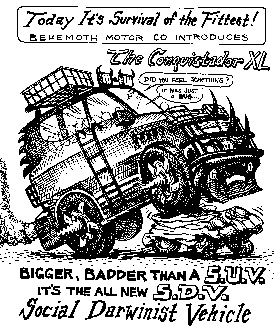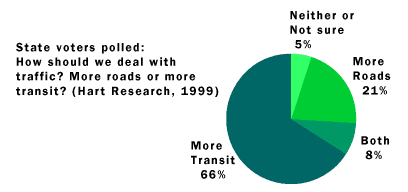
go to WASHINGTON FREE PRESS HOME (subscribe, contacts, archives, latest, etc.)
May/June 2000 issue (#45)
Increasingly, Washingtonians are becoming more and more frustrated with traffic. As we sit in congestion seemingly more appropriate to the smoggy climes of Houston or Los Angeles, we wonder how to ensure that a twenty-mile trip doesn't turn into an afternoon of bumper to bumper frustration. Remedies to the problem, of course, are as varied and abundant as the vehicles we drive, so settling on the right solution isn't easy. We bicker over the value of new roads or mass transit, debate the usefulness of HOV lanes and tax subsidies--but in the end, we all agree on one thing. We want to get where we're going faster, more easily, and with less headache.
Recently, a contentious new initiative has become part of this debate, claiming to be the panacea for all of Washington's traffic woes. Designed to strong-arm the state into spending 90 percent of its transportation funds on new roads, eliminate all HOV lanes, and make road building the state's top transportation priority, Initiative 711--provided the necessary signatures are gathered--will meet the voters in November.
The idea behind Initiative 711 is nothing new. For many, building our way out of congestion is an appealing solution to a growing problem. Are traffic jams and slow commutes bothering drivers? Simply add a couple more lanes, a new road if necessary, and poof--problem solved. Annoyed at sitting in traffic while the carpool lane to your left collects dust? Why not open them up and let everyone have equal access? Our problems would be a thing of the past, right?
Unfortunately for true transportation reform, such answers are based on the kind of reasoning that enables children to believe in Santa Claus. Strip away the rhetoric, the hollow soundbites and specious reasoning, and you'll find future problems masquerading as present day answers.
Take the issue of carpool lanes, for instance. In a quote taken from the official 711 website, proponents assert that, "Carpool lanes are a social engineering failure that artificially create traffic congestion in order to force us out of our vehicles." A shiny bit of rhetoric, to be sure, but is it true?
In a recent study of traffic on I-5 at 145th Street, general purpose lanes were shown to be significantly less productive than the carpool lane. During the a.m. rush hour the general purpose lanes required 2,150 cars to carry 2,500 commuters, while the carpool lane needed a mere 1,550 cars to get 5,250 commuters to work.

The problem, of course, with carpool lanes is that when you're driving alone and mired in traffic, it's easy to gaze at that expanse of pavement with envious, even malicious thoughts. Especially when a car full of happy commuters whizzes by, breaking your reverie on just what the bumper sticker in front of you actually means. In such circumstances our ability to accept the notion that carpool lanes are a functional solution to congestion seems directly proportional to the amount of time we have to spend stewing in traffic. Or to put it simply: The longer we wait, the more we want into that lane. But the fact remains that, lane for lane, it is impossible to find an example of when an HOV lane is not a more efficient means of getting commuters to and from work.
In 1998, according to the Population Reference Bureau, Washington State contained 5,439,000 people. In the next several years that number is expected to easily surpass six million as Washington, along with many other states, experiences significant growing pains. As the population increases, new roads will inevitably need to be built and old ones maintained. Initiative 711, however, reaches much further than ensuring that future residents have sufficient pavement. It reduces Washington's arsenal of traffic-cutting solutions to one clumsy broadsword--road building--and removes our ability to use proven methods to reduce congestion.
In a recent ruling Superior Court Judge Robert Alsdorf found found I-695, which changed the state's vehicle excise tax to a flat $30 fee and gave voters the power to regulate their own taxes, unconstitutional. And although the Washington Supreme Court has yet to hear the appeal of that ruling--the case is slated to appear before the court in late June--the legislature has already passed a bill mandating that the $30 excise fee remain in place. Across the state, transit agencies have coped with the ensuing budgetary bites by reducing personnel and cutting services. Many of these cuts have come at the expense of those least able to afford it: the disabled and elderly communities, as well as many low and middle income families that rely heavily on bus service.
The passage of Initiative 711 would not only mean that the buses, carpools and single occupant cars would share all lanes of traffic equally, it would also mean that everyone riding a bus or using a carpool would have a huge disincentive to continue traveling to work that way. Without a real incentive for people to use mass transit alternatives, all of those newly opened lanes of traffic would play host to a lot of new drivers who would otherwise be sharing vehicles--or as proponents of the Initiative 711 would have us believe, succumbing to a misguided program of "social engineering" that caters unnecessarily to the needs of the disabled and elderly communities.
Supporters of Initiative 711 characterize carpool lanes and buses as fiscal white elephants, or even worse, evidence of a socialistic conspiracy to undermine our sovereign individualism. The vast majority of Washingtonians, however, believe that mass transit, dedicated lanes, and road building are all key components of a sound transportation system--not some sinister effort to manipulate us out of our cars. If we are to adequately meet the needs of the future, we will need all of these tools--not simply new roads--to ensure that congestion does not overwhelm the state.
Kevin Doran is the Administrative Director of Transportation Choices Coalition, a nonprofit organization dedicated to ensuring that viable transportation alternatives are provided to the public.
For more information on Transportation Choices Coalition please call 206-298-9338 or visit them at www.TransportationChoices.org.

|
go to WASHINGTON FREE PRESS HOME |